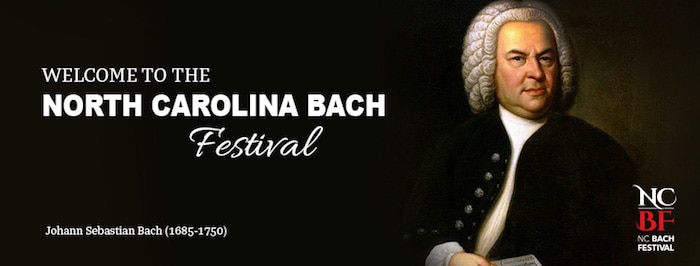
North Carolina Bach Festival was founded in 1979 as a statewide celebration of Johann Sebastian Bach. It features concerts with interpretation of his work as well as of other composers of his era.
Several of the concerts take place in the Triangle, and some of those are free. The free concerts in the Triangle are listed below. See a list of all of the concerts, both free and ticketed, around the state.
North Carolina Bach Festival 2018 Annual Youth Concert
Sunday, February 25th
4 p.m. to 6 p.m.
White Memorial Presbyterian, 1704 Oberlin Road, Raleigh
Free (but register at above link)
The North Carolina Bach Festival annual celebration of young artists honoring the legacy of great composers of the past immortalized in the life and the musical heritage of Johann Sebastian Bach.
Over 30 registered young artists and ensembles from diverse parts of North Carolina will perform music by Johann Sebastian Bach and other composers of his era. Expert jury will select the most beautiful performances and award Elfrida Helbig Memorial and NCBF Young Artist awards. The awards will be anounced at the reception immediately following the concert.
Bach’s Six Suites on a Double-bass with Poetry
Friday, March 2nd
7:30 p.m.
White Memorial Presbyterian, 1704 Oberlin Road, Raleigh
Free (but register at above link)
The first Featured Artist Concert of the 39th season of the North Carolina Bach Festival features amazing musician and a remarkable person Richard “Dobbs” Hartshorne who will perform Bach’s Six Cello Suites on the double-bass in their original keys exactly as initially composed. His beautiful rendition will be interspersed with poems about the Suites by phenomenal Irish poet Macdara Woods.
Andrew Willis, Baroque fortepiano & Brent Wissick, viola da gamba
Friday, March 9th
7:30 p.m.
First Presbyterian Church, 112 South Salisbury Street, Raleigh
Free (but register at above link)
The third Featured Artist Concert of the North Carolina Bach Festival 2018 featuring works by Johann Sebastian Bach performed by two significant champions of the informed interpretation of Baroque music.
The program includes:
Partita 4 in D major, BWV 828 & Partita 5 in G major, BWV 829 for fortepiano; and Sonata in D major BWV 1028 & Sonata in G minor BWV 1029 for viola da gamba and keyboard.
A reception folows the program.
